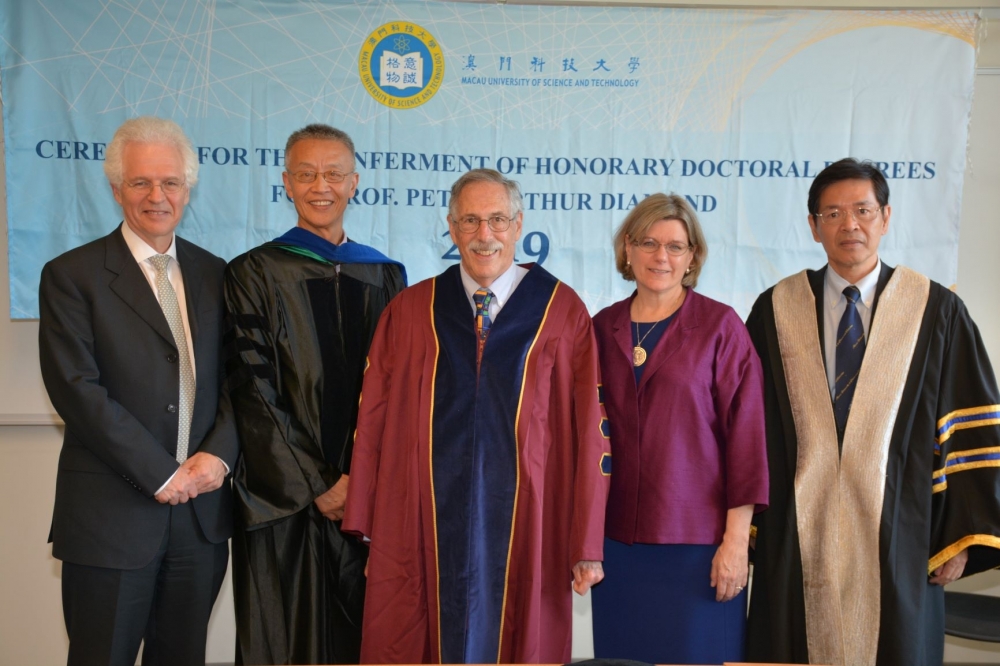Macau University of Science and Technology conferred Honorary Doctor of Business Administration upon Prof. Peter Arthur Diamond, one of the three Nobel Laureates in Economic Sciences in 2010 and Institute Professor at Massachusetts Institute of Technology (MIT), on 8 May 2019 at MIT, Boston.

(From right) Prof. Lin Zhijun, Prof. Peter Diamond, Prof. Sun Jianrong
Prof. Lin Zhijun, Vice President and Prof. Sun Jianrong, Associate Vice President of M.U.S.T., traveled to the U.S. representing the University to confer the honorary degree. Prof. Nancy Rose, head of the Department of Economics at MIT chaired the ceremony. Prof. Lin made a speech, on behalf of M.U.S.T. President Liu Liang, to honor Prof. Diamond for his significant contributions to the advancement of human well-being; and Prof. Sun read the citation at the ceremony.
Prof. Richard Lester, Associate Vice President of MIT, spoke about the accomplishments of Prof. Diamond, the recognition MIT bestowed upon him and the appreciation and admiration of M.U.S.T. for his accomplishments in his academic pursue. In his speech, Prof. Lester conveyed MIT President Rafael Relif’s greetings to President Liu and expressed his gratitude for this specially arranged occasion by M.U.S.T. on MIT campus. As one of the world’s foremost economist, Professor Diamond’s contributions have been made both in basic research and in the analysis of public policies, and his studies of the pension systems in China and other countries are a beautiful example of how MIT engagement with research and education can bring benefits to people around the world, including China, while simultaneously contributing to improving the welfare of the American people.
Both MIT and M.U.S.T. presented Prof. Diamond with its highest honor, Institute Professor and Honorary degree respectively, recognizing his outstanding contributions and role model character. Prof. Lester expressed his appreciation to Prof. Lin and Prof. Sun for strengthening the connections between MIT and M.U.S.T.
Prof. Diamond colleagues from MIT also attended the ceremony, including Prof. Alberto Abadie, Prof. James Poterba, Prof. Anna Mikusheva, Prof. Marios Angeletos, Prof. Emeriti Michael J. Piores, Prof. Emeriti Richard S. Eckaus, Associate Simon Jäger and also research students.
Prof. Diamond is a renowned American economist and Institute Professor at MIT. He is an accomplished author on public finance, social insurance, uncertainty and search theories, macroeconomics and behavioral economics. As one of the three winners of the 2010 Nobel Prize in Economic Sciences for “analysis of markets with search frictions”, Prof. Diamond has made “fundamental contributions to search and matching theory, which offers a framework for studying frictions in real-world transactions and has led to new insights into the workings of markets.”
Prof. Diamond is also known for developing an overlapping generations model (otherwise known as the OLG model or the Diamond model), which has been widely used for analyses of debt, social security systems and intergenerational aspects of taxation. His work with James Mirrlees on taxes and government expenditures, production efficiency result, design of shadow prices for government production decisions, optimal income taxation, and the optimal structure of benefit rules in social security systems has produced far-reaching impacts on the world economic development and social security strategies. In addition, Prof. Diamond has done extensive work on pension policy. He has analyzed pension systems in various countries and regions, and advised governments on policy-making decisions relating to pension systems and reform of pension policies. He has given talks in Beijing, Shanghai and also provided pension policy consultation for the Chinese government. He was the recipient of the Award for Outstanding Achievements of the National Academy of Social Insurance (NASI) in 2008 for his remarkable research contributions in social security and government policies.

(From right to left) Prof. Lin Zhijun, Prof. Nancy Rose, Prof. Peter Diamond, Prof. Sun Jianrong, Prof. Richard Lester





